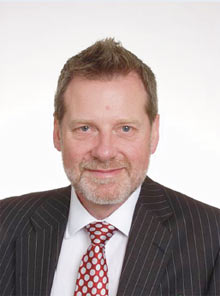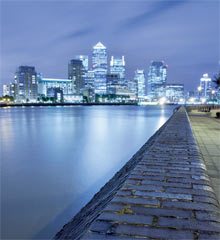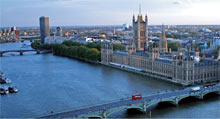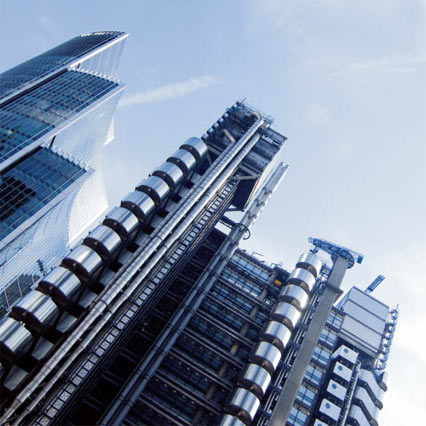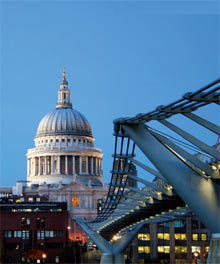Tony Gasking: General Manager of MAPFRE RE in LondonMARKETS
"The biggest achievement has been to place MAPFRE RE on the map outside of its traditional markets of Spain and Latin America" MAPFRE RE is today a major reinsurance company in the London market with the careful and measured direction of retiring general manager of the London Branch, Tony Gasking. He discussed his career in interview.
A velvet revolution
Tony is a not a big gambler. He loves to play bridge and is chairman of his local bridge club so he understands the basic riskreward equation as any underwriter or bridge player.
When he joined MAPFRE RE back in 1991, MAPFRE RE was a medium sized player in International markets and little known in the London market. Between 1991 and 2008 gross written premiums have grown to EUR 1,800 million for the Company and from EUR 6 million to EUR 55 million for the London operation.
“And in London we did that without writing LMX (London market excess of loss) treaties and taking risky business,” he said.
Tony Gasking says that now is not a good time for the reinsurance market as the market grapples with economic uncertainty, growth opportunities are currently limited and the landscape and understanding of insurance are unclear in many of the emerging markets that offer the best underlying potential.
But Tony believes that the job is far from impossible for his successor in the London office of MAPFRE RE. This is because they will be able to build on a firm foundation that is based on the traditional principles of capital strength, quality underwriters and solid long term relationships built over time that have served him and the group so well over the last 40 years or so, personally, more than 25 years for MAPFRE RE so well for more than 25 years.
But his outlook is fundamentally cautious and having spent so long in the heart of the world’s oldest insurance and reinsurance market where so many so-called stars have crashed on the rock of over-ambition that is not surprising.
He now of course presents the picture of the typical experienced and easy-going London market man. But his early life certainly did not mean that he was destined for the financial market, let alone the archane world of the London insurance market. Like so many of his contemporaries he simply fell into the role and was smitten, never to leave.
Tony was brought up in North London but left for the beautiful cathedral city of Canterbury aged 14 as his father took a promotion to run the Inland Revenue Collection office there. He said it was a lovely experience for a family to escape from London in the era of post-war austerity and he thoroughly enjoyed his new school in the countryside.
“I was a generalist not a specialist but had always enjoyed languages and was particularly interested in Spanish, French and latterly economics,” he said.
When he joined MAPFRE RE back in 1991, MAPFRE RE was a medium sized player in International markets and little known in the London market
He started to learn Spanish soon after French when still at Grammar school in London at the age of 13. Like many native English speakers he only managed to master the skill because of his personal interest rather than the structured method of teaching with forced reading still so common in the UK.
“I enjoyed it, especially translating. The problem for English people learning foreign languages is the education system that puts you off, particularly foreign literature, for years,” he said.
Tony left school for Bristol University and did a Combined Honours Degree in French, Spanish and Economics.
Like many bright English youngsters of his generation Tony left university with no fixed plans for how he wanted to use his languages, other than work overseas and further his interest in economics and business.
He therefore applied for any job that offered an overseas appointment and ended up accepting a graduate trainee position with the Phoenix Assurance Company because it had a wide network of international offices.
Unfortunately at that time the opportunities for graduates like Tony to work overseas were limited because national governments wanted to ensure that such opportunities were made available for locals. When a vacancy was advertised in the group’s reinsurance office - Tariff Re (later re-named London Guarantee & Re) in 1971 he decided to apply, despite the fact that he knew nothing about reinsurance.
Tony got on very well with the general manager, Arthur Lowndes, who interviewed him for the role and has stayed in the market ever since. “I have never met anyone who originally intended to pursue a career in reinsurance,” he said.
He learned his basic management technique from this man. “He showed me how I like an office to be run, by setting a good example yourself not by subjugating your staff but by motivating them to want to develop the company the way you want it to be developed. I have never been one to complain about a long lunch, a late start or an early finish as long as it is for the right reasons and the job is done. This is particularly effective when people need to work extra hours such as during the renewal seasons,” he said. Tony met his wife, Carol, while at Tariff Re.
The Phoenix was bought by Sun Alliance in 1985 but the Sun Alliance had experienced difficulties with its own reinsurance operation at the time and had decided to exit the line. Unfortunately L.G. & Re had no future in the new group.
Tony left the company with three colleagues and set up an operation for Japanese insurance group Yasuda as assistant general manager. This went well until the hurricane Hugo in 1989 and the European windstorms of 1990 devastated the market.
Tony always kept clear of the London market excess of loss business that created the famous London market spiral and destroyed so many careers.
Unfortunately Yasuda had not been out of the LMX market as a group and, as he stated, the Japanese company decided to “throw the baby out with the bathwater” and closed down its reinsurance business worldwide.
Tony was put in touch with MAPFRE RE that wanted to open a London office at the time and was looking for an experienced manager who could understand the MAPFRE way of doing business. Tony was recommended because of his knowledge of Spanish that he admits was rather rusty at the time.
“When I went to Madrid in 1991 I had not spoken Spanish for two to three years and not frequently for ten to fifteen. The interview with the Deputy General Manager began in English but when the general manager came in to say ‘good morning’ I greeted him in Spanish,” explained Tony.
“From that moment on we spoke Spanish for the whole day through interviews with several of the senior people. Also it was 43ºC! We took lunch and then they put me in a taxi to the airport. On the flight home I tried to calm down!. Fortunately it was all worth it and I was offered the job to join in October 1991. It was a great result to find myself working for a Spanish company. My mother said, “who would have thought all that work you did when you were at school would lead to this!” he continued.
Tony always kept clear of the London market excess of loss business
His role initially was as a non-proportional treaty underwriter for the brand new operation which was initially a Representative Office.
Because of his market standing Tony was able to bring some 75% of the business he had underwritten at Yasuda to MAPFRE RE. His colleagues in Spain were delighted because previously they had been lucky to see one or two layers. But Tony was able to bring them the whole programme and vastly increased their London portfolio from brokers.
“I knew people in the market and so I was shown the whole programme, rather than the odd layer they had seen before, and was able to transfer it across to Spain as we were only a contact office at the time”, he said.
It was important for MAPFRE RE to hire an experienced London market manager because at the time very few people had heard of the company unless they worked in or with the Spanish or Latin American markets.
Tony took a cautious and long term approach from day one only writing short tail lines such as property and catastrophe. His local boss, Leslie McKinnes, left in 1992 and he was offered the job to take charge.
This was an exciting time for Tony and MAPFRE as the group wanted to expand and set up a branch office. The plan was to build the business through close long term relationships with the London brokers who dominate this market.
All we need in the London office is a front line active service
As he worked with his growing team to set the foundation a further opportunity arose to manage the 350 year-old listed building that MAPFRE RE occupied following the group decision to close its stock broking arm.
The management of the building was not a simple task because of its age and listed status. Tony recalls dramas with English Heritage when maintenance works had to be done.
The Branch license was acquired in 1994 and that really boosted the London business. A marine underwriter was hired and Tony began to look for an alternative base. Although the office is only five minutes walk from Lloyd’s of London it was off the beaten track and not ideal to service the notoriously lazy London market broker community, he joked.
MAPFRE RE then secured a spot in the London Underwriting Centre (LUC) in 1996 that, along with the appointment of another underwriter, increased inwards premium volume by around 30% in one renewal. The LUC office worked well until rent costs rocketed in 1999, companies left and this, coupled with the rise of electronic trading in the London reinsurance market, meant that it was no longer as attractive.
“We were seeing less traffic and also decided in 1999/2000 to close the facultative account because it was not doing too well and the facultative underwriters drew a lot of traffic into the LUC office. The brokers were beginning to say we don’t care where you are and walking between the two offices was taking up to an hour a day that was disruptive so we decided to bring everything back to MAPFRE House,” explained Tony.
“There is still very much a value to being in the London market and the face to face contact remains critical, perhaps more so than ever. Our cedants come to London, which gives us an additional opportunity to meet them, and MAPFRE likes to be very close to its customers,” he added.
The London office is staffed by six people today and Tony describes it as a highly efficient operation. It is able to personally serve its core relationships but on a lean cost base as support functions such as legal, investment and accounting services are carried out in Madrid through one fibre optic cable.
“All we need here is the sharp end. We have me, a property and a marine underwriter, treaty analyst doing catastrophe modelling and the like, plus a financial and a technical accountant and we are on the verge of hiring a couple of new people. Our profile has grown from writing only 1.5-2% shares of programs to a lead company with double-digit shares. You have to be much surer of the technical position as the game has changed. You can no longer balance thousands of small participations with a broad spread so you have to be certain you have adequate pricing,” he said.
Asked why he felt the London operation needed to change and grow Tony explained that it was driven by market forces not ego or some blind desire to grow at all costs. “Risks are bigger and the market could not handle them in the same way. Insurers have merged and therefore the risks they seek to transfer are bigger. They are able to retain more but create bigger exposures,” he said.
Tony also said that the shrinking retrocession market has demanded bigger reinsurance capacity because reinsurers are forced to retain more. And, of course, the modern reinsurance company needs greater diversity of risk by line and geographical spread because the exposures are greater and the demands on capital ever greater from the emerging risk-based supervisory systems worldwide.
The challenge for my successor is to find new ways of doing business beyond what we currently do, such as life, accident and health
The future for the MAPFRE RE and the wider reinsurance market is secure he says because traditional reinsurance works, offers continuity and is much better understood by ceding companies than alternative forms of supposed risk transfer and is generally more economic.
Tony sees growth opportunities in areas and fears that the over ambitious or impatient could become impaled again on the tricky and very spiky casualty market, for example. “You can only do more of the same for so long, of course, therefore the challenge for my successor is to find new ways of doing business beyond what we currently do, such as life, accident and health. “Stick to your knitting but find new patterns. Do not start crochet,” he advised.
Best and Worst
Tony Gasking’s worst moment in his career came in 2001 after the combined forces of the terrorist attacks on the United States, emerging long tail liabilities for U.S. casualty business written between 1997 and 2001 and the collapse in both debt and equity markets seemed to threaten the future survival of the market as a whole.
“We had experienced a very good run up till then and the London Branch was making a lot of money but we lost money that year. There was a real concern about the London operation but we survived because we had returned strong profits every year till then, delivered strong cash flow and a good number of senior executives understood the value of the business,” he explained.
Tony says his biggest achievement was to place MAPFRE RE on the map outside of its traditional markets of Spain and Latin America.
“We raised the profile to the level where we do not have to chase business. Also on a personal level I created a team of people one of whom has been with us since 1993, one since 1994 and two since 1998.
There has been no staff turnover. If you do the simple things well then this is the result. We have never been diverted by high premium risks and we are a long term player. In life I generally don’t see any advantage to be gained from making change for change’s sake and perceived opportunities that often turn out to be pitfalls,” he said.
What next?
Tony Gasking has never had a master plan for his life other than the vague idea that he would pursue a career that would help him use his love of languages in a business context.
It should therefore come as no surprise that he has no big structured plan for his retirement other than the understandable goal of ‘emigrating’ to Shropshire, a beautiful and sparsely populated corner of England on the Welsh border. A perfect place to pursue his love of walking. “Only the weather is against it so we’ll probably spend the darkest winter in Continental Europe,” he said.
We wish them all the best.
